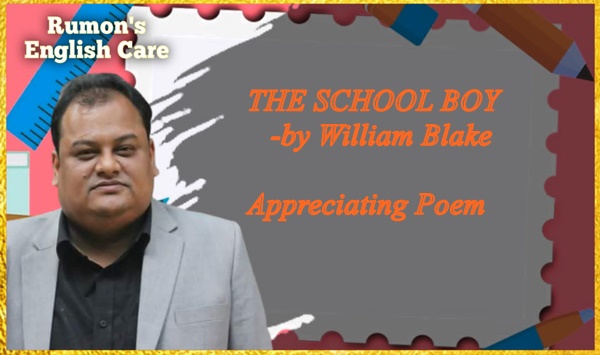THE SCHOOL BOY
THE SCHOOL BOY,
-by William Blake
I love to rise in a summer,
When the birds sing on every tree;
The distant huntsman winds his horn,
And the skylark sings with me;
O what sweet company
আমি গ্রীষ্মের সকালে জাগতে ভালোবাসি,
যখন পাখিরা গাছে গাছে গান গায়;
দূরের শিকারী তার বাশি বাজায়,
এবং ভরত পাখি আমার সঙ্গে গান গায়:
ও কি মধুর সঙ্গ!
But to go to school in a summer morn,
O it drives all joy away!
Under the cruel eye outworn,
The little ones spend the day
In sighing and dismay.
কিন্তু গ্রীষ্মের সকালে স্কুলে যা্ওয়া
ওহ, সব আনন্দ তাড়িয়ে দেয়
নিষ্ঠুর চোখের শাসন ক্লান্ত হয়ে,
ছোট্ট বালকটি দিন কাটায়
দীঘশ্বাস ও হতাসায়।
Ah then at times I dropping sit,
And spend many an anxious hour;
Nor in my book can I Take delight,
Nor sit in learning’s bower,
Worn through with the dreary shower.
আহ তখন কখনো আমি কাল্ত হযে বসে পড়ি্
এবং অনেক উদ্বিগ্ন ঘন্টা কাটাই,
না আমার বইতে আমি আনন্দ পাই,
না পড়ার কক্ষে বসে,
বিষাদ বষনে কাল্ত হয়ে যাই।
How can the bird that is born for joy
Sit in a cage and sing?
How can a child, when fears annoy,
But Drop his tender wings,
And forget youthful spring.
আনন্দের জন্য জন্ম নেয়া পাখিটি কিভাবে
পারে খাচার ভিতর বসে থাকতে এবং গান গাইতে?
কিভাবে একটি শিশু যখন ভয় বিরক্ত করে,
পারে তার কচি ডানা গুটিয়ে রাখতে।
এবং ভুলে যেতে তার সবুজদীপ্ত বসন্ত।
O father and mother if buds are nipped
And blossoms blown away;
And if the tender plants are stripped
Of their joy in the springing day,
By sorrow and care’s dismay,
ওহ, পিতা এবং মাতা যদি কুড়িগুলো নষ্ট করা হয়
এবং ফুল সব উড়িয়ে নেয়া হয়,
এবং কচি চারাগুলো উপড়ে ফেলা হয়
বসন্ত দিনে তাদের আনন্দ বেলায়,
দু:খ এবং যত্নের অবহেলায়,
How shall the summer arise in joy,
Or the summer fruits appear?
Or how shall we gather what griefs destroy,
Or bless the mellowing year,
When the blasts of winter appear?
তাহলে কিভাবে গ্রীষ্ম আনন্দে জেগে উঠবে
অথবা গ্রীষ্মে ফল আসবে?
অথবা কিভাবে আমরা পাবো যা দু:খ বিনাস করে,
অথবা সমৃদ্ধ বছরকে আর্শীবাদপুষ্ট করে,
যখন শীতের আঘাত আসবে?
Note: The theme of the poem is the inborn feelings of oneness with nature. Another important theme of the poem is the negative sides of formal learning. The speaker of the poem is a young boy who’s at school in the summer. He can’t focus in class because he wants so badly to play outside and enjoy the weather; he feels like a songbird trapped in a cage. Towards the poem’s end, the boy wonders how children can grow and thrive if they are not allowed to enjoy the summer.
a)Answer the following questions.
(i) In the poem, who is referred by the word ‘I’?
Answer: In the poem ‘I’ refer to the speaker himself that means a school boy.
(ii) How do the little one spend the day in the school?
Answer: The little ones spend the day in singing and dismay in the school.
(iii) What drives the boy’s joy always?
Answer: The thought of going to school on a summer morning drives the boy’s joy away.
b) How many stanzas are there in the poem?
Answer: Six
c) Match the rhyming words in the following table.
| Column A | Column B |
| (a) tree | (i) horn |
| (b) away | (ii) me |
| (c) bower | (iii) shower |
| (d) morn | (iv) appear |
| (e) joy | (v) dismay |
| (f) year | (vi) annoy |
Answer:
| Column A | Column B |
| (a) tree | (i) me |
| (b) away | (ii) dismay |
| (c) bower | (iii) shower |
| (d) morn | (iv) horn |
| (e) joy | (v) annoy |
| (f) year | (vi) appear |

